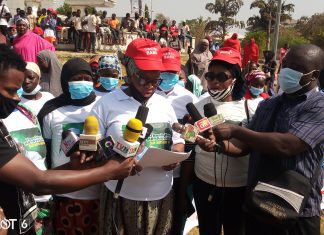The Federal Government is dedicated to making sure that every barrel of crude oil produced in Nigeria adds genuine value to the country’s economy both domestically and internationally, according to Heineken Lokpobiri, Minister of State for Petroleum Resources (Oil).
Speaking at the 2025 CORAN Summit in Lagos on Tuesday, the minister stated that the government’s goal of energy self-sufficiency and sustainable economic growth included giving priority to domestic refining capacity.
Lokpobiri emphasized that enhancing local refining and guaranteeing energy security were essential to Nigeria’s long-term development objectives, as he was represented by his Technical Advisor, Ndah Adaba.
With the topic “Refinery Key to Energy Security in Africa,” the summit convened energy professionals, engineers, investors, and policymakers from all around the continent to talk about the continent’s progress toward refining independence.
According to Lokpobiri, the Domestic Crude Oil Supply Obligation (DSCO) of the Federal Government guarantees that all licensed domestic refineries have steady supply to feedstock for their operations.
In addition to licensing, he stated that the government is facilitating the delivery of crude oil to domestic refiners by implementing the Domestic Crude Oil delivery Obligation.
“Naira for Crude,” which was launched to stabilize the market, will continue to be essential in lowering the cost of producing fuel, minimizing exposure to fluctuations in currency rates, and assisting domestic refinery operations,” he said.
“If a country cannot refine its own crude, it cannot claim energy independence,” the minister said.
Lokpobiri emphasized recent changes, stating that the Nigerian Midstream and Downstream Petroleum Regulatory Authority (NMDPRA) had made the refinery licensing procedure simpler.
In order to remove bureaucratic obstacles and attract reliable investors, he claims that the procedure, which includes the Licence to Establish, Licence to Construct, and Licence to Operate, has been simplified.
Lokpobiri stated, “This administration supports real investors who can produce results, not those who thrive on red tape.”
“The Success of Indigenous Refineries”
Lokpobiri cited regional success stories propelling Nigeria’s refining revival, including the Waltersmith Petroman Refinery, the Dangote Refinery & Petrochemical Complex, and Aradel Holdings.
Indigenous success stories like Aradel Holdings, Waltersmith Petroman Refinery, and Dangote Refinery are among those we have seen today. He stated, “These show that Nigerians have the ability and the desire to refine our crude locally.”
Such initiatives, he claims, “symbolize confidence in government policy direction” and are consistent with President Bola Tinubu’s Renewed Hope Agenda, which highlights domestic refining as a major factor in the creation of jobs, energy independence, and industrial revival.
Nigeria Introduces the Fuel Market in West Africa
In an effort to improve regional collaboration, the minister announced that the Federal Government has established the West African Fuel Reference Market, a project that aims to establish Nigeria as West Africa’s center for petroleum distribution and refining.
“With more domestic refining capacity, Nigeria will be able to meet its own needs and establish itself as a trustworthy supplier to its neighbors,” Lokpobiri said.
He added the project is in line with the African Continental Free commerce Area (AfCFTA) framework, which aims to increase intra-African commerce and lessen reliance on foreign refineries, as well as the African Union’s energy integration initiatives.
In order to draw in both domestic and foreign investment, Lokpobiri stated that the Federal Government would prioritize feedstock security for all licensed refiners and increase fiscal incentives.
For the purpose of fighting crude oil theft, stopping pipeline vandalism, and promoting goodwill with host communities, he continued, cooperation between the Ministry of Petroleum Resources, NMDPRA, NUPRC, and security agencies was being improved.
“Our refineries and the institutions that support them are the keys to Africa’s energy security,” Lokpobiri stated.
As the continent strives for independence, he called on African countries to strengthen their collaboration in shared energy infrastructure, logistics, and product interchange.
As a result of government reforms and increased local refining capacity, Nigeria’s imports of Premium Motor Spirit (petrol) have decreased to their lowest level in eight years.
Nigeria got 116,000 barrels of gasoline per day (18.44 million liters) in September, compared to 154,000 barrels per day (24.49 million liters) in August, the lowest amount since 2017, according to a recent report by Argus Media.
Improved local output, policy changes, and ongoing maintenance at the 650,000 barrels per day Dangote Refinery, which has temporarily reduced operations, were cited in the study as the reasons for the reduction.
The Petroleum and Natural Gas Senior Staff Association of Nigeria (PENGASSAN) and the refinery’s management recently got into an industrial conflict, but observers believe the ongoing decline in imports shows that domestic refining is becoming more and more popular and that there is a slow but steady move toward energy independence.
Join Television Nigerian Whatsapp Now
Join Television Nigerian Facebook Now
Join Television Nigerian Twitter Now
Join Television Nigerian YouTUbe Now





